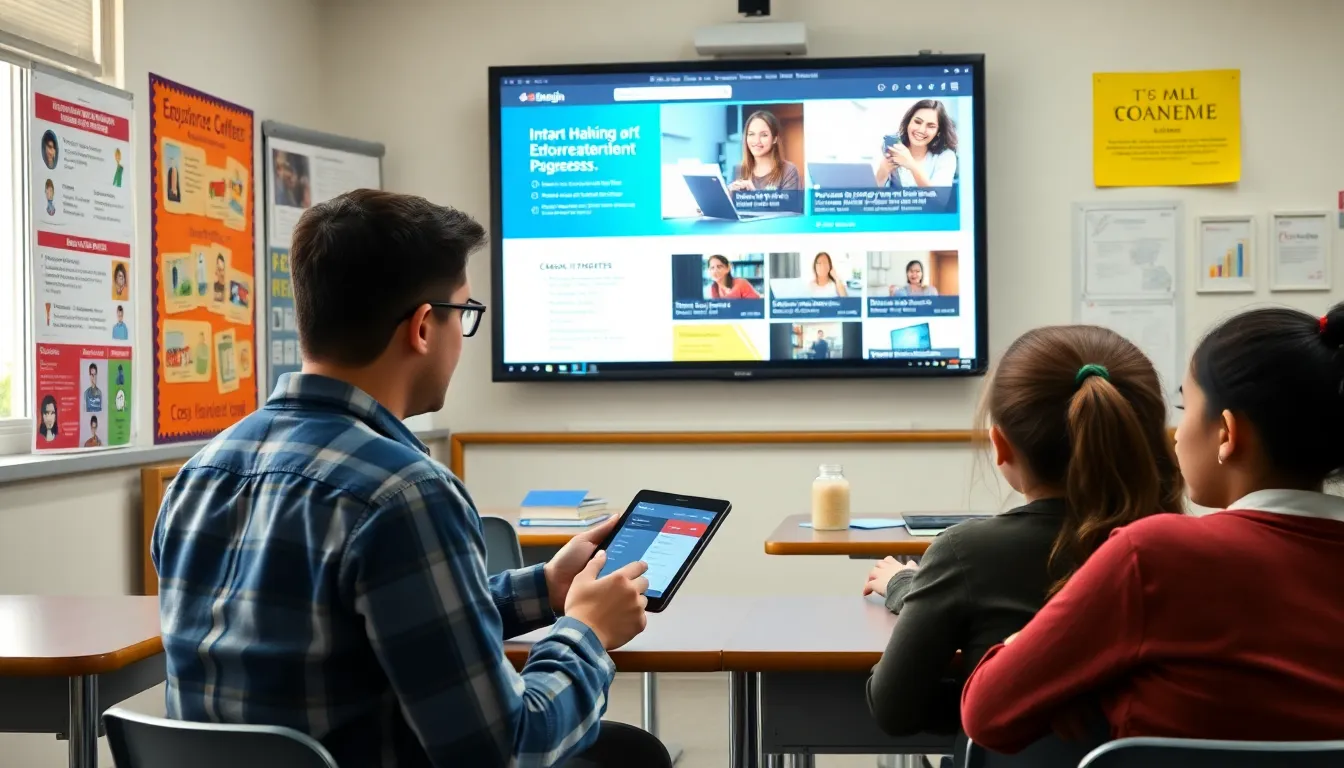In today’s fast-paced digital world, education technology, or EdTech, is revolutionizing how students learn and educators teach. With the rise of online courses, interactive tools, and innovative platforms, EdTech companies are at the forefront of transforming traditional education into a more engaging and accessible experience. They’re not just enhancing learning; they’re reshaping the entire educational landscape.
These companies leverage technology to create solutions tailored to diverse learning needs, making education more personalized and effective. As schools and institutions increasingly adopt these tools, understanding the impact and potential of EdTech becomes essential for educators, students, and parents alike. Exploring the dynamics of this booming industry reveals insights into the future of learning and the role technology plays in shaping it.
Table of Contents
ToggleOverview Of EdTech Companies
EdTech companies play a crucial role in modernizing education through innovative technologies and tailored solutions. These organizations aim to enhance learning experiences and improve educational outcomes across various platforms.
Definition And Purpose
EdTech refers to educational technology that integrates digital tools and resources into the teaching and learning process. The primary purpose of EdTech companies is to create products and services that facilitate efficient learning, provide personalized education, and engage students. These solutions include online learning platforms, mobile applications, learning management systems, and adaptive learning software, all designed to address diverse educational needs and improve overall student performance.
Key Players In The Market
Several prominent companies dominate the EdTech landscape, each contributing unique solutions and platforms. Key players include:
- Coursera: Offers massive open online courses (MOOCs) from universities worldwide, enabling learners to access quality education from anywhere.
- Khan Academy: Provides free educational resources across subjects, focusing on personalized learning experiences.
- Duolingo: Focuses on language learning through gamification, making it engaging and accessible for users.
- Edmodo: Provides a collaborative platform for teachers, students, and parents to communicate and share resources in a secure environment.
- Blackboard: Specializes in learning management systems, offering tools for institutions to create, manage, and deliver educational content effectively.
These companies significantly impact education by enhancing accessibility, supporting personalized learning, and improving engagement through technology.
Types Of EdTech Solutions

EdTech solutions encompass a range of tools and platforms designed to enhance teaching and learning processes. Below are key types of EdTech solutions that significantly impact education.
Learning Management Systems (LMS)
Learning Management Systems (LMS) serve as centralized platforms for managing, delivering, and tracking educational courses. These systems streamline course administration, enabling instructors to create and manage content, assess student performance, and facilitate communication. Popular LMS options include Moodle, Canvas, and Blackboard, each offering features like grade tracking, user-friendly interfaces, and integration with other educational resources.
Online Course Platforms
Online course platforms provide access to a wide array of courses across various subjects, often featuring trained instructors or pre-recorded lessons. They expand learning opportunities beyond traditional classrooms. Examples include Coursera, edX, and Udemy, which offer courses from reputable institutions and industry experts. These platforms enable learners to engage with diverse content, often at their own pace, enhancing overall accessibility.
Educational Apps
Educational apps focus on interactive learning experiences across different subjects, often targeting specific skills or knowledge areas. Users can find applications that teach languages, mathematics, science, and more. Notable examples include Duolingo for language learning, Khan Academy for varied subjects, and Quizlet for study aids. These apps often incorporate gamification elements to increase engagement, making learning enjoyable and effective.
Impact On Education
EdTech companies significantly transform education by enhancing learning experiences and fostering inclusivity. These technologies facilitate personalized pathways that cater to diverse learning styles and needs.
Enhanced Learning Experiences
EdTech tools provide interactive features that engage students effectively. For instance, platforms like Kahoot! and Nearpod incorporate gamified learning experiences, promoting active participation through quizzes and interactive lessons. Multimedia resources, such as videos and simulations, facilitate understanding complex concepts, making lessons more engaging. Adaptive learning technologies, like Smart Sparrow, assess student performance and adjust content accordingly, ensuring students receive tailored instructions that meet their specific needs. Overall, this personalized approach fosters deeper understanding and retention of knowledge.
Accessibility And Inclusivity
EdTech companies enhance accessibility, making education available to broader audiences. Online platforms like Coursera and edX provide free or low-cost courses for learners regardless of geographic location or socioeconomic status. Features such as closed captioning and screen readers support students with disabilities, breaking down barriers to learning. Furthermore, mobile applications enable anyone with a smartphone to access educational resources, expanding opportunities for lifelong learning. By prioritizing inclusivity, EdTech ensures that education is equitable and available to everyone, regardless of their background or circumstances.
Challenges Faced By EdTech Companies
EdTech companies encounter several challenges that can impact their growth and effectiveness in the education sector. Understanding these obstacles is essential for navigating the competitive landscape.
Technology Adoption Issues
Technology adoption issues present significant obstacles for EdTech companies. These companies often face resistance from educators and institutions reluctant to integrate new tools into their existing curricula. Concerns about the effectiveness of technology, alongside inadequate training, can hinder successful implementation. Additionally, the digital divide affects students’ access to devices and reliable internet connections, undermining the potential benefits of EdTech solutions. Research indicates that nearly 17% of students in low-income families lack consistent access to the internet, creating disparities in learning opportunities.
Competition And Market Saturation
Competition and market saturation challenge EdTech companies striving for differentiation in a crowded field. With over 20,000 EdTech startups worldwide, standing out requires innovative solutions and robust marketing strategies. Companies often struggle to establish brand recognition amidst established players like Coursera and Khan Academy. Additionally, constant technological advancements necessitate continuous updates and improvements to offerings, leading to resource constraints that can inhibit growth. According to a recent report, 55% of EdTech businesses cite increasing competition as a primary concern affecting their expansion goals.
Future Trends In EdTech
EdTech is poised for significant advancements that will shape the future of education. Key trends include the rise of artificial intelligence and the enhancement of gamification strategies to boost learner engagement.
Artificial Intelligence And Personalization
Artificial intelligence (AI) revolutionizes personalized learning in EdTech. AI algorithms analyze student data to identify learning patterns, enabling tailored educational experiences. Platforms like DreamBox Learning and Intelligent Tutoring Systems adapt content based on real-time student performance.
AI-powered chatbots provide immediate support, answering student questions and offering additional resources. These interactions encourage individualized learning pathways. The use of predictive analytics allows educators to anticipate student needs, enhancing intervention strategies for those requiring extra support. Furthermore, AI enhances accessibility by providing personalized recommendations for diverse learning styles and needs.
Gamification And Engagement
Gamification continuously transforms the learning environment by integrating game elements into educational content. This approach increases engagement through interactive features like points, badges, and leaderboards. Platforms such as Kahoot! and Classcraft implement gamified experiences that motivate students through friendly competition.
Gamified learning fosters deeper connections among peers, encouraging collaboration and teamwork. By providing immediate feedback and rewards, these platforms maintain student interest and promote persistence. Additionally, incorporating storytelling elements captivates learners, making content relatable and enjoyable. As game mechanics evolve, EdTech companies seek innovative ways to embed gamification, enhancing both academic performance and learner satisfaction.
The evolution of EdTech companies is reshaping the educational landscape by making learning more accessible and engaging. As these companies continue to innovate and expand their offerings, they play a vital role in addressing diverse learning needs and fostering inclusivity. The integration of advanced technologies like AI and gamification is set to further enhance the educational experience, creating personalized pathways for students.
While challenges remain in terms of adoption and accessibility, the potential for EdTech to transform education is undeniable. As educators and institutions embrace these changes, the future of learning looks promising, with technology paving the way for enhanced educational outcomes.










